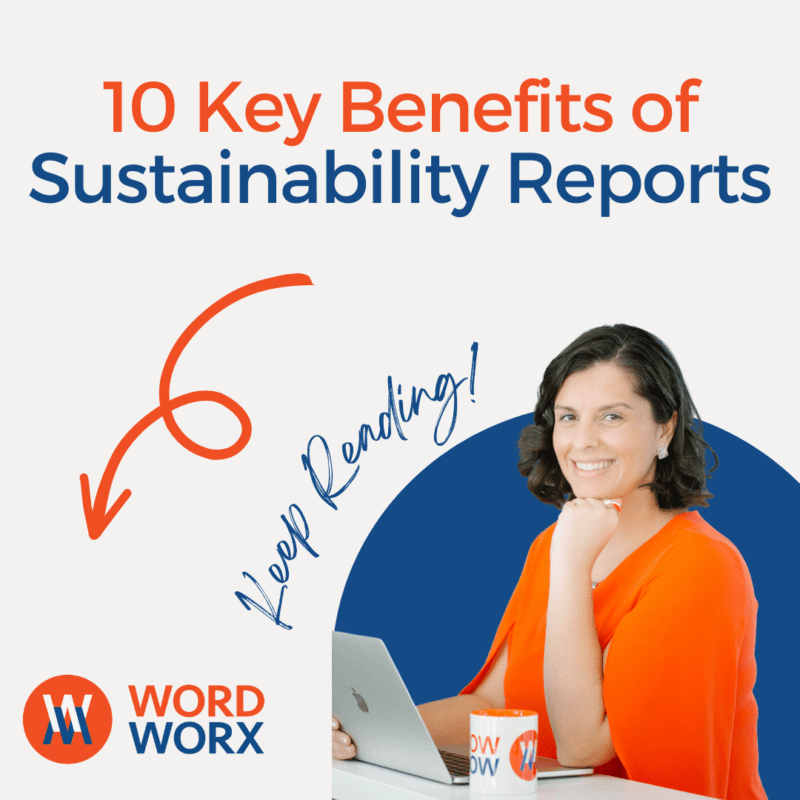
What are the key benefits of Sustainability Reports?
We live in an era where environmental concerns and social responsibilities are at the forefront of global conversations. Sustainability is a hot topic on everyone’s lips, but it is not a once-off fad or a temporarily trending topic. That’s because we are all, in one way or another, implicated in global warming, poverty, discrimination, and various other global sustainability challenges (whether we like to admit it or not).
That said, everyone should be involved in sustainability, especially if we are to achieve the 17 SDGs set out by the United Nations — that means all individuals, businesses, and governments alike need to act.
Added to this, companies are no longer evaluated solely based on their financial performance; their environmental and societal impact is equally scrutinised. And this massive shift has led to the rise of Sustainability Reporting — a practice that offers a comprehensive overview of an organisation’s commitment to environmental, social, and governance (ESG) factors.
In this blog post, I will explore ten key benefits of Sustainability Reports I’ve seen over the years and how such reports contribute to a more sustainable and accountable world. Here goes:
1. Transparency and Accountability
Sustainability reports provide a transparent view of an organisation’s operations, practices, and performance concerning environmental and social matters. By disclosing data on energy consumption, waste management, carbon emissions, employee well-being, diversity, and more, companies demonstrate their commitment to accountability. This transparency fosters trust among stakeholders, including investors, customers, employees, and regulators, as they gain insight into a company’s efforts to minimise negative impacts and contribute positively to society. Note — statistics or facts cannot demonstrate transparency and accountability alone. A sustainability report writer can help you achieve a strong, clear narrative that conveys your company’s sustainability story/narrative.
2. Stakeholder Engagement
Corporate communication professionals will know that effective communication is essential for building strong stakeholder relationships. Sustainability reports serve as a medium for companies to engage with and involve their stakeholders in the organisation’s sustainability journey. These reports facilitate conversations about shared values, concerns, and aspirations, allowing companies to tailor their strategies based on stakeholder feedback. In actual fact, engaged stakeholders are more likely to support and invest in companies that align with their values and prioritise sustainability.
Remember — it’s fundamental to ensure that the language you use throughout your report meets the varied target audiences you’re trying to achieve. This is by no means an easy task, and it’s imperative that you use personas to analyse the kind of language each stakeholder ground utilises, as this will help you better implement vocabulary within your report.
3. Risk Management
Another of the key benefits of sustainability reports is that they enable organisations to identify and manage potential risks associated with environmental and social issues. By evaluating these risks, companies can proactively implement measures to mitigate negative impacts on their operations, reputation, and finances. This strategic approach helps companies stay resilient in changing regulations, market dynamics, and societal expectations. Having a report covering ESG matters ensures that all content on the topic is discussed in a single place, so in this sense, it is easier to ensure greater risk management of various challenges.
4. Competitive Advantage
As sustainability becomes a key consideration for consumers and investors, companies that embrace sustainable practices can gain a significant competitive edge. Sustainability reports highlight a company’s commitment to responsible business practices, making it an attractive choice for environmentally conscious consumers and socially responsible investors. Moreover, businesses prioritising sustainability often innovate and develop new products, services, and processes that align with evolving market demands. That’s why I always recommend to those corporate communication managers I work with that a strong sustainability narrative is key, which is fluid across various communication channels even better.
5. Long-Term Value Creation
Sustainability reports contribute to long-term value creation by encouraging companies to adopt sustainable practices that enhance efficiency, reduce costs, and minimise waste. Embracing a triple-bottom-line approach—balancing economic, environmental, and social impacts—leads to a more resilient and future-ready business model. This approach benefits the company’s financial performance and contributes positively to society and the environment. Additionally, as a brand tool, a sustainability report has major benefits as it can propel and strengthen a company’s brand.
6. Regulatory Compliance
Added to the above key benefits of sustainability reports, it’s important to consider regulatory benefits. Companies must adapt to remain compliant as governments worldwide tighten environmental protection and social responsibility regulations. Sustainability reports help companies track their progress toward meeting these regulations and demonstrate their commitment to meeting global sustainability goals, such as the United Nations Sustainable Development Goals (SDGs).
7. Investor Confidence
Investors are increasingly considering ESG factors when making investment decisions. Sustainability reports provide investors with valuable information about a company’s sustainability performance, helping them assess its long-term viability and risk profile. Companies can attract investors and access sustainable investment funds by showcasing their commitment to responsible practices.
8. Marketing and Brand Building Benefits
As mentioned above in point 5, sustainability reports can enhance a company’s marketing and branding efforts. When a company showcases its commitment to sustainability through these reports, it differentiates itself from competitors and appeals to consumers who prioritise ethical and responsible business practices. A well-crafted sustainability report can be a powerful marketing tool, allowing companies to share their sustainability achievements and initiatives with their target audience. Working with an experienced sustainability report writer can elevate your report even more.
9. Employee Engagement and Recruitment
A CEO recently told me about an outreach activity that a branch of the company in Spain was undertaking. The company annually does a beach clean-up at a local beach. During the event, onlookers saw the company employees (all wearing the same t-shirt that day). The onlookers were so impressed that they wanted to know more about the company and if they were hiring!
A commitment to sustainability can significantly impact employee engagement and recruitment efforts. Employees are more likely to feel motivated and proud to work for a company that prioritises social and environmental responsibility. Sustainability reports communicate a company’s values and initiatives to potential and current employees, attracting individuals who share the company’s vision for positive change. Engaged employees contribute to a positive workplace culture and increased productivity.
10. Innovation and Adaptability
Sustainability reports encourage companies to innovate and adapt to changing environmental and societal demands. By setting goals and benchmarks related to sustainability, companies are more likely to invest in research and development to create innovative solutions that align with their ESG objectives. This commitment to innovation addresses current challenges and positions the company as a leader in anticipating and addressing future sustainability issues.
As you can see, sustainability reports have various key benefits, extending beyond the more obvious environmental and social considerations. From transparency and stakeholder engagement to risk management, competitive advantage, marketing, employee engagement, and innovation, these reports can transform businesses into more responsible, accountable, and positively branded entities. I hope sustainability reporting can become more human-centric and inspiring — and not just a document for checking the boxes — but to honestly show how we contribute to a more sustainable world and drive positive change.
Interested in learning how a sustainability report writer can support you in getting results when it comes to ESG reporting? Contact Elizabeth Joss of WordWorx today: info[AT]elizabethjoss.com.
